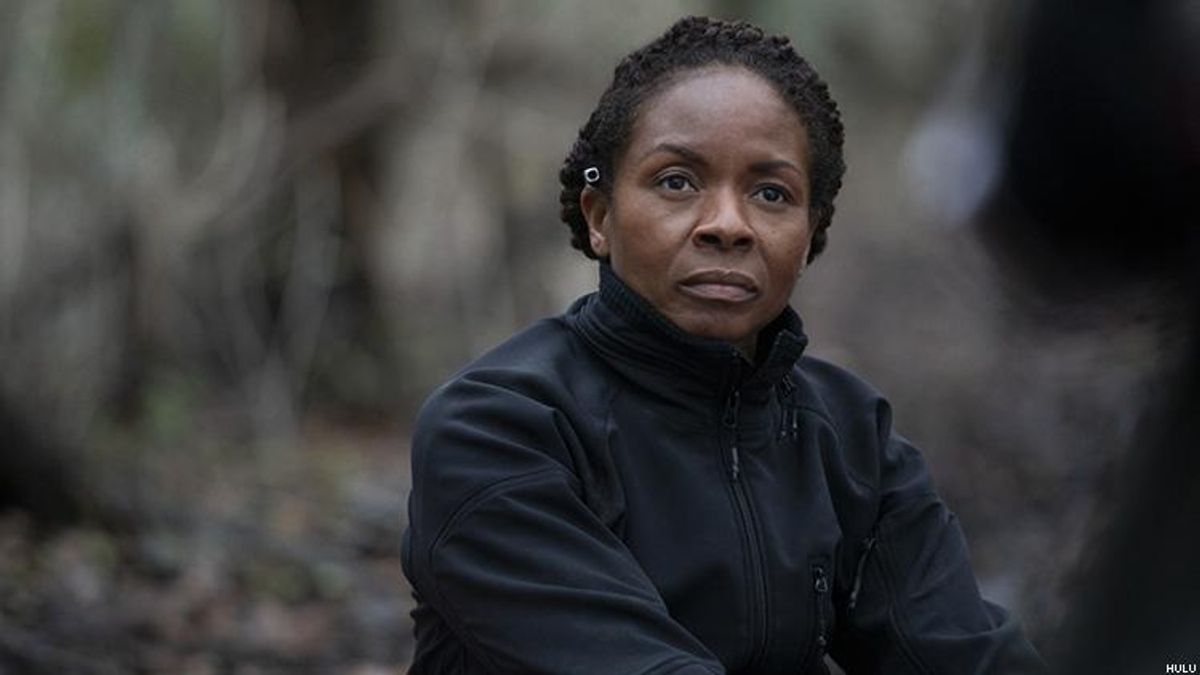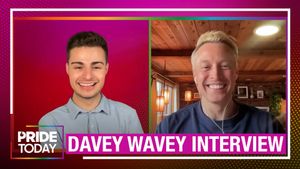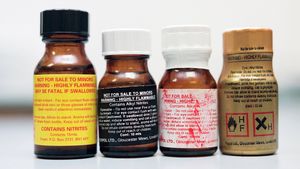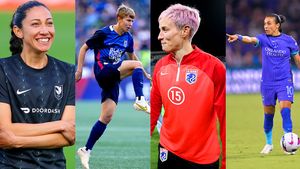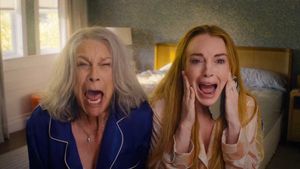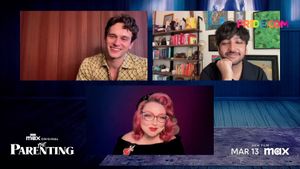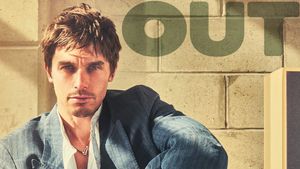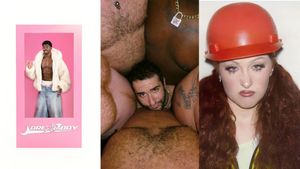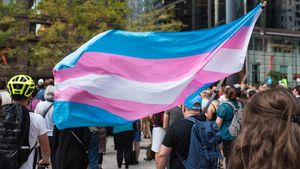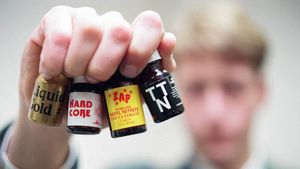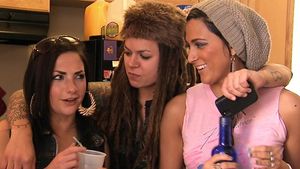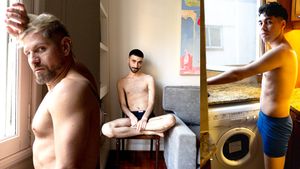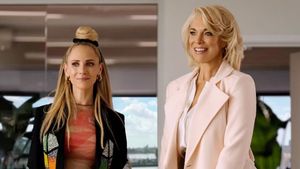Prehistoric man tosses a bone into the air early on in 2001: A Space Odyssey only for director Stanley Kubrick to graphically match it with a satellite traveling in space some millennia later in one of the most famous cuts in the history of cinema. The story shifts to inside the spacecraft to focus on the recalcitrant computer Hal and the astronauts it torments, but one thing is clear from Kubrick's interpretation of the future -- it was envisioned as belonging to straight white men.
Hulu's bold new space travel series The First dares to contemplate a future in which women, people of color, and queer people are included in the narrative, much like recent stories about future space travel. But the series, from House of Cards creator Beau Willimon, stops short of naively imagining that racism, sexism, and homophobia have all but disappeared in a time just over a decade away.
The technology depicted in The First has slickly evolved to include even more automation and the ability for more sophisticated space travel, but it's a world in which fixed attitudes about social mores are still slow to change, even if the world appears to be more diverse. The character of Colonel Kayla Price, a black, queer womanplayed by veteran actress LisaGay Hamilton (The Practice, Go for Sisters, Krush Groove), bumps up against all of those intersections. Even as an accomplished and decorated military member, she's forced to navigate a career in which her position as commander of a mission to Mars circa 2030 is handed to Sean Penn's grizzled commander Tom Hagerty, essentially only because he's white and male.
"All things being equal, you didn't think I should be the face of this program. I'm black. I'm a woman. I'm queer," Hamilton's Kayla tells Natascha McElhone's Elon Musk-esque genius financier Laz Ingram.

Natascha McElhone and LisaGay Hamilton
Laz, a straight, wealthy, white woman, protests Kayla's characterization of the situation as couched in racism and sexism, but the colonel bravely lays out the age-old discrepancy between the privileged and the marginalized.
"I'm telling you how it feels. I get why you did what you did. The funding. His experience," Kayla says. And the actress who plays her applauds the show's willingness to depict the reality of identity in a series that also asks sweeping questions about the origin of being.
"There's no way that in the year 2030 everything poof is going to go away," Hamilton tells The Advocate. "We've never lived in a post-racial society. It doesn't exist and it will never exist."
The actress bolsters her assertion with an anecdote about being on the receiving end of emboldened racism when she was recently kicked out of a furniture store for pointing out to the manager that the white couple who came in well after her was waited on immediately while she was never even approached by a salesperson.
"I have the utmost appreciation for [creator Beau Willimon's] writing team and himself who decided 'let's bring reality to this. 'That [racism, sexism, homophobia] is not going to go away," she adds. "I thought that was ballsy of him to do that."
A Julliard alumna with a storied career in television, film, and theater, Hamilton brings an impenetrable sensibility to the role of Kayla, who is steeped in military culture and beholden to the chain of command all the while knowing that she's been passed over.

Hamilton
Recently, Hamilton, who is also a director, appeared in arcs on Hulu's Chance, and on House of Cards. She also just completed three films with Brad Pitt's Plan B entertainment, including the Dick Cheney biopic Backseat, Ad Astra, and Beautiful Boy, the latter of which stars Timothee Chalamet. But with all of that work under her belt, Hamilton, like Kayla, is aware of how her identity as a woman of color -- of a certain age -- can limit opportunity. She's pragmatic about taking on a new project like The First.
"The first genuine answer is it's a job," she says of taking on the role. "Especially as a woman of color and of a certain age now, it gets harder and harder to find work."
"The icing on the cake was that it was such a rich and interesting story. Not just my storyline, but the whole idea of what is it to risk one's life for something out of this world." Hamilton adds. "My character was so complex and interesting. And there was a great deal of potential to explore who she was in a meaningful way."
To prepare for the role, Hamilton says she read a great deal and had sit-down sessions with Willimon about the world of The First. But there was also more practical preparation like donning a spacesuit and feeling the weight of it and a VIP tour of Johnson Space Station in Texas where the cast saw astronauts work with a natural-buoyancy pool. But beyond the cool science-based part of researching her role, Hamilton was most moved by the story of Jeanette Epps, a black female astronaut she asked to speak to about her experiences.
"I had the honor and privilege of working with Jeanette Epps, who ironically, was supposed to be the first black woman on the space station and sort of like my character, she was set to be on a particular mission and she was cut at the last minute," Hamilton says.
Epps, a former CIA analyst who'd completed all of her training to be a flight engineer on the international space station was pulled at the 11th hour and replaced by another woman, who is white. While Epps would not speculate on possible contributing factors like race when discussing her removal from the mission, Hamilton is able to explore all of the intersections of Kayla's identity and how she's treated on the job.
"There was quite a debate about that -- whether or not that [racism and sexism on the job] would be true to 2030. [A] very heated argument," Hamilton says. "There is just no way that we should shy away from that because it's not going anywhere."
"It was in many ways liberating," to play the reality of systemic race and gender bias, she adds.
"For Jeanette Epps, X amount of months later to be denied access to space travel when she was trained for that, assigned for that, and twice denied for no reason -- that was for Kayla," Hamilton says of the similarities between her character and Epps. "There was absolutely no reason for her to not be commander. As a viewer, I agree with that."
While Kayla's mission is marred by a system that places straight white men at the center of progress, The First, which juxtaposes the private lives of the astronauts with their professional personas, does afford Kayla a rich home life with her wife Nancy (Rent's Tracie Thoms). Hamilton, who is straight and married with two sons, was cognizant of doing justice to the queer piece of Kayla's identity.

Sean Penn and Hamilton
"Our obligation is to portray these two beautiful women who really do love each other. We had to really navigate how we wanted to portray that," Hamilton says of working with Thoms. "I couldn't have asked for a better TV wife ever."
The First drops on Hulu September 14, and there's no telling yet if its depiction of the near-future will resonate for audiences enough to land a second season. But Hamilton says that even if all the seeds are planted for seasons to come, Willimon has just scratched the surface of thorny possibilities around white male hegemony.
"The larger perspective of the show, which may or may not be explored [in future seasons], is the idea of, once again, to colonialize another Earth, another planet --for white men to come over and plant their little foot over there," Hamilton says, pointing to the sorting that would naturally follow. "Who's going to get to go? Who's not going to go? Who decides?"
